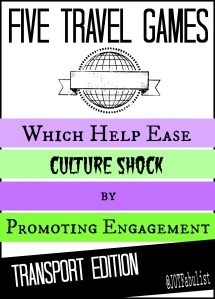Five equipment-free travel games which help ease culture shock by promoting gentle engagement (transport edition)
We made it to Phuket – by bus, LRT, train, minivan, and taxi. Not everyone appreciates the wisdom of travelling overland like this with two kids, aged three and six, but our reasons go beyond a desperate desire to reduce our carbon footprint/limit our flight-related radiation exposure/get hits off google for search terms like “Singapore Kuala Lumpur by bus”.
Travelling overland at the start of a trip helps reduce our kids’ culture shock. It allows them to experience a new place from a safe distance, behind a sturdy window pane, before they have to venture directly into the middle of everything. And yes, sure, we could achieve a similar result with a hop-on-hop-off city tour instead of a complex ballet of pivotal international connections, but then we’d never get those google hits.
The catch is, it doesn’t work if we pass the time on entertainment which shields them from the world they’re travelling into – in fact, it works best if we actively engage them in their surroundings, using the structure of familiar games as an extra cushion against the unknown.
So I thought, before I take you on our trip through Southern Thailand, I’d supply you with a list of our top five equipment-free, culture-shock-proofing, engagement-enhancing games for use on transport – plus modifications for all levels of player.
1. I Spy
Beginner
The familiar “I Spy” formula can be played using colours instead of letters for non-spellers.
Example:
“I spy, with my little eye, something coloured pink!”
“Is it a ribbon?”
“Aaaaaarrrggghhnooooooo! Say, ‘Is it your dress?!'”
“…Is it your dress?”
“No.”
Intermediate
This is the more familiar speller’s version.
Example:
“I spy, with my little eye, something beginning with ‘D’.”
“It has to be ‘dirt’. We’re crossing The Nullabor.”
Advanced
Like the intermediate version, but encompassing complex or technical descriptions and even opinions, rather than just simple nouns.
Example:
“I spy, with my little eye, something beginning with ‘L’.”
“Limestone bedrock.”
“Very good. Your turn.”
“I spy, with my little eye, something beginning with ‘G’.”
“I give up.”
“It’s the ‘Gimboid’ who thought I Spy was and excellent car game for crossing The Nullabor’.”
2. Spotto/Car Bingo
Beginner
Challenge everyone to be the first to spot a single, common item.
Example:
“First one to spotto a tree! Wow, so fast, and I think everybody won at the same time!”
Intermediate
Challenge everyone to spot a rare item, or a short list of several items.
Example:
“First one to spot a VW beetle!”
“First one to spotto a palm tree, a temple, and a motorbike!”
Advanced
Challenge everyone to spot an extremely rare item, or a long, complicated, and/or technical list of items.
Example:
“First one to spotto a purple VW beetle, a cumulo-nimbus cloud formation, a pitched tent, a droughtmaster bull, a tableau of no less than three items composed almost entirely of no more than three chemical elements each, any nocturnal mammal out wandering during daylight hours, and an example of divergent evolution!”
3. Musical Mashup
Beginner
Change the words of a simple nursery rhyme to reflect the scenery outside. Make up actions. Get everyone to sing along.
Example (To the tune of The Wheels On The Bus):
“The man in the rice paddy goes weed (pluck) weed (pluck) weed (pluck)! C’mon, you too, T!”
Intermediate
Take turns changing the words to, and making up actions for, a simple song.
Example:
“…aaallll daaaay loooong. And now let’s hear it for P with verse two!”
Advanced
Adapt progressively longer and more complicated pieces of music.
Example:
“Alright focus, people! We’re going to start performing our adaption of the second opera of Wagner’s Ring Cycle just as soon as we pass under this next bridge.”
4. I Went To {Place Name} With A Billion Dollars And I Bought….
Beginner
Take turns simply revelling in the absurd concept of being able to buy anything at all.
Example:
“I went to Thailand with a billion dollars and I bought that huge tree!”
Intermediate
Take turns thinking about the local and relative market value of items outside the window. Keep a running account of how much money you’d have left after each “purchase”. Start each new turn by repeating, from memory, the items so far “purchased” by the other players.
Example:
“I went to Thailand with a billion dollars and I bought that pink house back there (as you said, P), and a motorbike (as you said, T), and a mango drink. Which at local rates would set me back about USD$100k, leaving a remaining total of USD$999900000 with which Æ would buy…?”
Advanced
Use the game as an opportunity to discuss the consistency and transparency of local law enforcement and the social, political and economic conditions which affect and flow from this state of affairs.
Example:
“I went to Thailand with a billion dollars. Now let’s pretend I racked up a speeding ticket and got caught without a valid visa.”
5. If I Lived In That House
Beginner
This game was a surprise favourite. Pick a house. State, in simple terms, what you’d do if you lived there. Use ridiculous answers if desired.
Example:
“If I lived in that house, I’d eat rice. And have superpowers.”
Intermediate
Pick a house. State what you’d do if you lived there. Be prepared to briefly explain your answers in cultural, geographical and socio-economic terms.
Example:
“If I lived in that house, I’d eat rice. For breakfast! Because that’s common here. And then I think I’d spend the day working hard and enjoying few comforts, because that is not exactly a millionaire’s shack.”
Advanced
Pick a house. Give a detailed and well-researched breakdown of your typical day, including the historical, cultural, geographical, socioeconomic and personal factors involved. Express as much as you can in the local language.
Example:
“If I lived in that house, I’d have K̄ĥāw for breakfast. This is a staple food of the region, for several reasons. First, local meteorological conditions dictate that…”
What Should We Try For Next Time?
It’s possible we may have reached our point of fatigue on some of these during our Thai trip (which we just arrived back from and will tell you about soon). If you have a favourite car game which gets kids discussing the stuff outside the window, please say. And feel free to give a straightforward name and description, rather than making us guess based on the first letter, or delivering it to the tune of a well-known nursery rhyme. It’s absolutely fine if you don’t do that.
Squash
Ian In Cyberspace suggests a great game called “squash” which involves watching for traffic markings on the road and yelling “squash” every time your car goes over them. Kids are encouraged to watch out of the window, maintain a prolonged focus, and scare the pants off the driver. Probably not suitable for public vehicles.
Suggestion from Grandma (that’s my mum) – a quieter version for public/shared transport is having everyone touch their toes/put their hands on their heads/etc instead of yelling out. Loud and quiet versions can be amended so the action happens whenever you see a nominated object out the window. Malaysian Meanders used to play this version, lifting feet (and putting a finger on a screw!) when going over railway tracks – but it doesn’t have to be lifting feet, or railway tracks.
Alphabet
Jen from And Three To Go has another good suggestion for spellers. Starting at the beginning of the alphabet, you look around until you see an object starting with each letter in order. First to get to Z wins. (The advanced version probably involves the use of a foreign script.)
Shape Game
Nanny (that’s my mother-in-law) suggested a find-the-shape game for small children. You can spot squares, triangles or circles in buildings, road signs, temples, agricultural buildings, or whatever else you happen to be passing. Good for the really young ones.
Navigation
Paul remembers using a map to foresee and check off passing landmarks. An excellent game for slightly older kids who can grapple with reading and abstract symbols. Extend the game by giving them a calculator and a speedometer reading and having them answer “When are we going to get there?” all by themselves.
Counting Games
Sreejith Nair used to play counting games on long car rides. Pick a common item and see how many you can spot. Cars or trucks are popular, but bonus points for including something unique to the local landscape, like temples, or pictures of the Royal Family.
Leah of Kids’ Bucket List has an advanced version where the car is divided into teams and counts only things on their side. Up the ante by having points wiped when you pass a certain feature (such as a cemetery).
This post is part of a series on using travel games to ease culture shock in young children. See part two: Five equipment-free travel games which help ease culture shock by creating a mental cocoon (transport edition).
The post Five equipment-free travel games which help ease culture shock by promoting gentle engagement (transport edition) appeared first at Journeys of the Fabulist and was shared as part of Family Fun Friday #73.












A wonderful list! I’ve been too permissive in letting my kids get so absorbed in their electronic devices that they don’t look up at what’s gong by. I need to put some of these advanced versions into practice. I really like the Navigation idea. My older ones would probably enjoy it. I remember playing a game like Squash when I was a kid. Whenever we went over railroad tracks, we had to lift up our feet and put our finger on a screw head.
LikeLike
Just realised I never got around to adding this one to the list! Will do now!
LikeLike
Excellent games! Just in time for my trip this weekend! I will certainly be trying these games. So much fun! But now I am thinking of games on the 5 hours flight to and fro on a budget airline… do you have good ideas? Can’t play traffic games, car games but certainly the nimbo-cumulus!
LikeLike
That’s the trouble with airplanes – not much to see out the window! Try my next post along:
The next post is on “internalising” games which are designed to get kids to stop looking out the window – much better for the plane. Although to be honest, I tend to fall back on electronics on longer flights.
Oh! But I do have a couple more posts if you want to stock up on ideas:
See if there’s any new ones in there that might suit you.
LikeLike
Great road trip games. Going to reblog!
LikeLike
Ha ha. Wonderful, B. Love no. 4, esp. I will keep these in mind! We do a lot of audio books on the road. Builds attention span, too. Go, carschooling!
LikeLike
Ah, building the attention span. Always a good one. I’ll have to do a post for games which aren’t quite equipment-free. Audiobooks are certainly still extremely packable for trips!
LikeLiked by 1 person
Ha! Lordy, I’d have a hard time doing the advanced (“Pick a house. Give a detailed and well-researched breakdown of your typical day, including the historical, cultural, geographical, socioeconomic and personal factors involved. Express as much as you can in the local language.”) if it was my own house and I lived there for 20 years. Too funny. My ex had two children from a previous marraige. When we travelled with them young, I would drive all night while they slept. We kept the trips short enough that was possible (like visiting their grandparents- 1000 kms). As they got older we usually allowed them to bring a friend each on extended trips – this worked very well as we had a van.
I must confess your struggles with entertainment brings back some fuzzy memories from my young child hood. As soon as I could read a map, I would navigate and could amuse myself for hours with just a map – checking off everything we passed and imaging where the side roads all went. I can still spend hours pouring over a map.
LikeLike
Oh yes! Maps! Our parents would also have us calculate (and then revise) our estimated arrival time based on distance left and average speed. I guess that was their answer to “are we there yet/well when are we going to get there?” Can’t wait til we reach that stage.
I’ll add your suggestion now.
LikeLike
What excellent games! Though it made me feel a bit insecure as a parent. I find my kids are so much more observant and perceptive than me that I often find myself overwhelmed by all their questions as they stare out the window. If I played games like these I think they would lose all respect for me!
LikeLike
You’re definitely not alone. The kicker when you’re travelling is you can’t always run to Prof Google like you do at home, either. This is when I fall back on that old trick of turning the question around to ask what they think the answer is, although lately they seem to be on to that one…
LikeLike
We play geographical locations, a place-naming game, though you’re children probably aren’t old enough yet. My daughter and I also make up bingo cards for things to spy from the car. We always make the games coverall. It keeps us busy for a while.
LikeLike
Bingo cards sounds very organised. The closest I got this trip was some scrawl on the back of an old shopping docket.
How do you play geographical locations? I need to take notes for later!
LikeLike
You are a determined parent – we cave in most times and out came the Nintendo DS or now the Ipod /Ipad etc… On the rare occasion that we play a game it is ‘yellow car no bags’ don’t ask how it started – simply be the first to spot an unusual coloured car.
LikeLike
Oh don’t worry – we use the games sometimes as well. As I said to inesephoto, above, though, we find in some situations it’s easier in the long run to do it this way, because then we don’t have to deal with so much of the culture shock when we’re walking around later. I haven’t turned into a total screen snob or Stepford wife or anything 🙂 .
LikeLike
You’d make a good Brownie Leader Bronwyn…..
Loved the ‘squash’ suggestion. It’s a bit like lifting your legs when you go over a train line and ducking your head when you go under a bridge. You could do ‘cultural versions’ of the idea – touch your toes when you see a paddy field!
My Brownies always loved using a chosen consonant to begin every word to a favourite song. Such as ‘ba beels bob ba bus bo bound band bound’. Gets quite naughty sometimes which of course makes them laugh more. It’s not exactly cultural but it’s a lot of fun and uses up loads of time especially if they go right through the alphabet.
LikeLike
I credit Brownies with teaching me half these things, but I’m not sure I could handle that many players at once.
Good (quieter) amendment to the Squash game – I’ll add it.
The other one is good, too (I’d completely forgotten about it) but it’s probably a better fit for the next list. I’ll remember to include it then.
LikeLike
Good ones. I’ll have to test these in a week and a bit when we are lucky enough to have more time to sit in the car;) so far it’s been more like who falls asleep first (great for spotting the other universe) or dad’s radio channel, a’s story cd or v’s music. I don’t even get to fight… but maybe that’s mainly due to short distances. Time will tell.
LikeLike
Good luck! Although I’m sure at least some of them are old favourites in your car already. You’re lucky to have kids who sleep well in the car – that definitely helps a lot. Makes the journey so much more relaxing!
LikeLike
I like the idea of traveling overland…for kids it might reduce the cultural shock…even for adults, the experience seeps in…which is, to my mind, a better way to travel…I, for instance, prefer to travel to the destination of holiday by train…builds up the anticipation, and is definitely more interesting than travel by flight….on the return journey, I take a flight..because by then I am too tired and want to get back to the comfort of my own bed!
LikeLike
I also like it for that reason. Flights are more practical sometimes, but they’re always so dull! You’re right about the anticipation, too.
I can appreciate wanting to just get home through a magic door (or as close to a magic door as possible) when you’re tired at the end of a trip – definitely know that feeling. It was good to jump on the plane home at the end of this recent trip instead of going through the reverse journey.
LikeLike
Fantastic! Used to play some of these with my daughter:)
LikeLike
There’s definitely a few classics in there – but they’re classic for a reason!
LikeLike
More fun than staring at your iphone all the way. Already sent the link to my daughter:)
LikeLike
I have to admit we do use the iPhone sometimes (especially on planes and in queuing situations where we need to pay attention elsewhere), but I prefer to save it for those moments when they (or we…) really do need a break, and not just everywhere because it’s the easier thing to do in the short run. Especially since using these games saves us effort later on. Culture shock doesn’t make for very manageable behaviour and iPhone withdrawal makes them really, really cranky.
LikeLike
Agree with you. Also, iPhone is good for the time when they really want to be left alone.
LikeLike
Yes!
LikeLike
Thanks for sharing, by the way! If you or your daughter think of any games to add, be sure to pipe up!
LikeLike
Thank you! Have a pleasant day!
LikeLike
As a child I took many road trips with my family, what we always played was the alphabet game. Using whatever we could see around us (street signs, license plates, car names) we had to find all the letters in order. Whoever got to z first, won…. It took forever as there were not a bunch of Q’s or z’s to find.
This really on works in cars or busses though. I don’t remember seeing any signs really on our train trips. 🙂
LikeLike
Roads are definitely better for signs. Still, you could probably try just naming objects starting with each letter from a train and still get a pretty long way?
It’s a great idea – I love it and I’m adding it now.
LikeLike
What about screaming “squash” whenever the car speeds over a sign or symbol painted on the road. It totally unnerves the driver which keeps children focused and forgetting to fight in the back seat.
LikeLike
Oh, that’s a good one! For private vehicles, anyway – sounds like it could get a bit loud and rambunctious for the public bus. I’ve never heard of this one but I can definitely see the genius way it keeps them focussed. Thanks! I’ll add it.
LikeLike
You guys are simply AMAZING!! What fun parents you must be! I love the game ideas. I think I could start utilizing them with my daughter on our “long” two hour road trips! 🙂
LikeLike
Two hours is a very long time for a little kid (I remember a friend saying her first was so terrible with car trips that for the first two years she kept a radius of about twenty minutes from her house – so a very long time!)
I’m not sure how “fun” our kids think we are at the point we start lecturing them on socio-economics, but we try. It’s a bit harder when you’re the only adult in the car and you’re trying to drive, of course, but hopefully someone might get a new idea.
LikeLike
Haha, perhaps they will finally realize when they are adults stuck in an office most days! 🙂 Oh, and I like your friend very much, this is my philosophy most days as well!
LikeLike
Definitely good arguments in favour of keeping to a narrow radius for sanity’s sake sometimes. You have to weigh the pros and cons!
LikeLike
You certainly know how to set a fun challenge!
LikeLike
Come on Nanny – you’re good at entertaining young kids, especially the pre-speller age group. What tricks have we missed?
LikeLike
Looking for shapes (like animals, volcanoes) in the clouds – requires a keen eye and a sense of the ridiculous rather than science! Kids usually have the imagination bit covered.
LikeLike
That’s definitely a good one. I find there’s always more options for the primary school skill level so a few for the earlier age groups is a good thing.
LikeLike
Submitted with modifications – I think the cloud version is a better fit for a different list which I’ll get to soon (ish) but you can still spot shapes in buildings, plants, etc.
LikeLike
Bronwyn I never want to play advanced level of any of those games with your children who are likely far more clever than I! You are super parents. Believe it or not my kids are SO old that our long trips had no electronic games…because they didn’t exist! Some of your suggestions I recall only it was ‘first one to spot a dinosaur’. 🙂
LikeLiked by 1 person
You’re hilarious (and exaggerating – which makes me wonder how a car game called “exaggeration” would run, because that sounds fun).
It’s true, though – we did road trips all the time and at a certain point they invented those little one-trick hand-held computer games, but apart from that it was electronics-free and we just had to make our own fun. And we were happy about it! Because when we weren’t on holidays we didn’t even have time to make our own fun!
LikeLiked by 1 person
I believe you and I would be excellent at the exaggeration game Bronwyn. Likely we could get gold and silver medals if it becomes an Olympic sport.
Looking forward to hearing more about your adventures in Thailand. I’ve had travel envy the entire time you were away.
LikeLike
Well, unfortunately no rock climbing for you. It was always going to be a long shot. I’ll just have to leave that one up to you to investigate and try out.
LikeLike
I thought that might be a lot to ask with a three and five year old. All right if I must go myself I will. 🙂
LikeLiked by 1 person
I have no advice. In our car we mostly play, “Whose got their head phones cranked up too high?” for hours and hours.
LikeLike
Haha! Well, look – there’s definitely a time and a place for headphones, I’m not going to deny that we go there.
I’m guessing it’s harder to get kids to play these as they get older as well (but then hopefully they can handle their culture shock more independently by then, too. Please tell me that’s true?)
LikeLike
Yes, I think the culture shock gradually shifts from the kids to the parents.
LikeLiked by 1 person